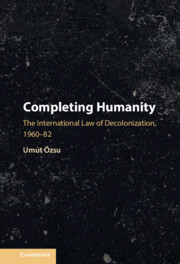Book contents
- Completing Humanity
- Completing Humanity
- Copyright page
- Dedication
- Epigraph
- Contents
- Acknowledgements
- Note on Terminology and Translations
- Table of Cases
- Table of Treaties and Other Instruments
- Table of Resolutions
- Table of Domestic Statutes
- Abbreviations
- Introduction
- 1 Fixing Selves
- 2 Forging Universals
- 3 Redistributing Resources
- 4 Pooling Rights
- 5 Righting Markets
- Conclusion
- Bibliography
- Index
4 - Pooling Rights
Published online by Cambridge University Press: 16 January 2024
- Completing Humanity
- Completing Humanity
- Copyright page
- Dedication
- Epigraph
- Contents
- Acknowledgements
- Note on Terminology and Translations
- Table of Cases
- Table of Treaties and Other Instruments
- Table of Resolutions
- Table of Domestic Statutes
- Abbreviations
- Introduction
- 1 Fixing Selves
- 2 Forging Universals
- 3 Redistributing Resources
- 4 Pooling Rights
- 5 Righting Markets
- Conclusion
- Bibliography
- Index
Summary
This chapter considers debates about the ‘common heritage of mankind’ during the 1973–82 UN Conference on the Law of the Sea. Postwar jurisdictional claims over ever-larger portions of the world’s oceans raised the possibility of an unregulated and destabilizing scramble for maritime rights, resources, and territories, culminating in what was often described as the enclosure of the oceanic commons. It also lent urgency to developing countries’ calls for a new law of the sea treaty that would reflect their own rights claims. The result was a series of fractious negotiations spanning nine years, at the centre of which was the question of how the deep seabed and its resources would be managed. Third World states sought an international organization authorized to oversee the deep seabed’s exploration and exploitation, coordinating the global distribution of resulting benefits. Industrialized states proposed a licensing system in which states and corporations would be granted concessions to mine in the international zone. Ultimately, ‘common heritage’ rhetoric proved central to the resulting treaty, but the ‘parallel’ system of seabed mining it legalized had the effect of ensuring that the ocean floor’s resources would be controlled largely by those with financial wealth and technological means.
Keywords
- Type
- Chapter
- Information
- Completing HumanityThe International Law of Decolonization, 1960–82, pp. 156 - 198Publisher: Cambridge University PressPrint publication year: 2023



